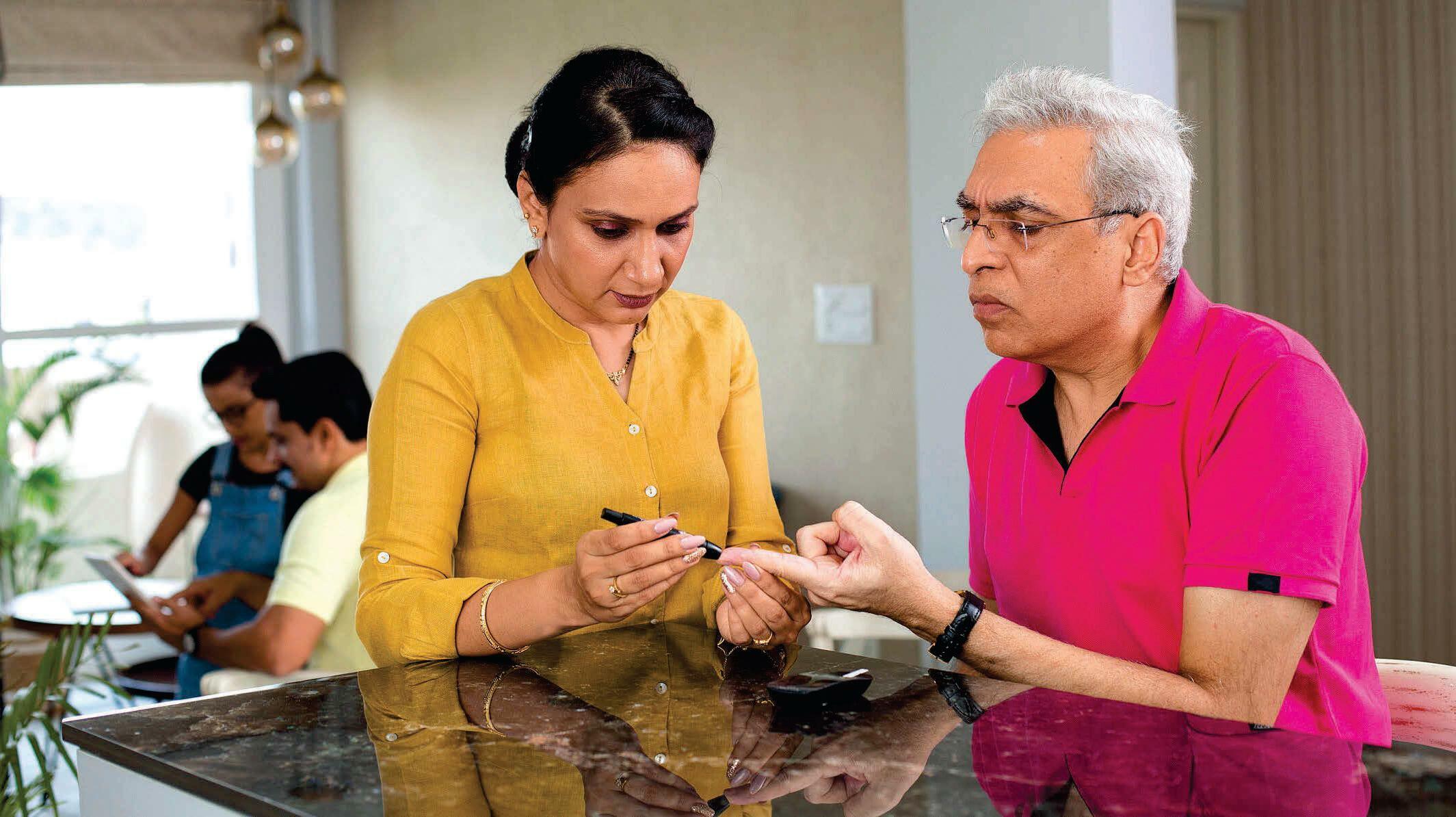Denemek ALTIN - Özgür
A grip on glucose
THE WEEK India
|September 07, 2025
The key to managing diabetes lies in moving beyond individual responsibility to creating supportive environments

India is the diabetes capital of the world. World Health Organisation data says there are 7.7 crore adult diabetics (type 2) and nearly 2.5 crore prediabetics in the country. More worrying is that half the population is unaware of its diabetic status.
Diabetes is a complex metabolic disorder that needs a nuanced understanding of genetics, lifestyle and modern medical management.
Layman's definition
Think of it as a problem with the body's 'sugar control system'. Usually, insulin—made in the pancreas—acts like a key, helping sugar from our food enter the body's cells to be used for energy. In diabetes, either the pancreas isn't making enough of that key, or the key doesn't fit well any more, so sugar stays in the blood.
The spectrum
Type 1 diabetes is an autoimmune condition where the body's defence system attacks insulin-producing cells. The exact cause is not known but research suggests it's a mix of genetic predisposition and certain environmental factors—viral infections being one possible trigger. This form typically appears suddenly in youngsters and requires lifelong insulin therapy.
Type 2 diabetes develops differently, with the body gradually becoming resistant to insulin's effects or the pancreas struggling to keep up with demand. Being overweight, physically inactive, having a family history, and ageing, all increase the odds. It can start with no obvious symptoms.
Gestational diabetes occurs during pregnancy when hormonal changes reduce insulin effectiveness. Women with a history of gestational diabetes, those who are overweight or who have a strong family history face higher risks.
The Indian context
India's diabetes epidemic is the result of a convergence of genetics, rapid urbanisation and changing lifestyles. Indians have a genetic predisposition to develop diabetes at lower body weights compared with western populations.
Bu hikaye THE WEEK India dergisinin September 07, 2025 baskısından alınmıştır.
Binlerce özenle seçilmiş premium hikayeye ve 9.000'den fazla dergi ve gazeteye erişmek için Magzter GOLD'a abone olun.
Zaten abone misiniz? Oturum aç
THE WEEK India'den DAHA FAZLA HİKAYE

THE WEEK India
WHERE THE STORM NEVER REALLY PASSES
Guantánamo Bay, once a symbol of the ‘war on terror’, has emerged as a flashpoint in Donald Trump’s immigration battles, exposing deep tensions between America’s security, legality and moral commitments
10 mins
December 21, 2025

THE WEEK India
Moderation is the key
Most people do not believe me, but I am a moderate man.
3 mins
December 21, 2025

THE WEEK India
OCEAN THERAPY
The Modi-Putin summit unveils a cooperation strategy that will rewire sea trade routes and expand India's maritime connect to the Arctic
3 mins
December 21, 2025

THE WEEK India
Indian Army men fighting for the British against the Japanese were also patriots
Readers in India may be misled by the title of Gautam Hazarika's new book, The Forgotten Indian Prisoners of World War II: Surrender, Loyalty, Betrayal and Hell. It is not about the INA prisoners who were put on trial in the Red Fort by the British. This book is about those Indian soldiers who fought the Japanese in Singapore, Malaya and Burma alongside the British, and who had to surrender, were taken prisoner, put to torture and hard labour by the Japanese, refused to join the INA, and faced death or managed to escape. While recounting their stories, Hazarika also gives an insight into the INA movement. Edited excerpts from an interview with the author:
4 mins
December 21, 2025

THE WEEK India
CHAT WITH NEHRU, QUERY KALAM...
The Prime Ministers' Museum & Library showcases the life and contributions of prime ministers and nation-builders
3 mins
December 21, 2025

THE WEEK India
The art of shifting gears in investing
“Hope is not a strategy,” Hayes growls in one memorable scene, dismissing a teammate’s starry-eyed optimism.
3 mins
December 21, 2025

THE WEEK India
Trouble on the tarmac
It is not IndiGo but Indian aviation that has become too big to fail
4 mins
December 21, 2025

THE WEEK India
SHUX AND BLUE MARBLE
THE 18 DAYS IN SPACE MIGHT HAVE MADE HIM A HOUSEHOLD NAME, BUT GROUP CAPTAIN SHUBHANSHU SHUKLA IS AS GROUNDED AS EVER. AND BEFORE HE SUITS UP FOR HIS NEXT MISSION, THE WEEK'S MAN OF THE YEAR SHARES STORIES FROM HIS LIFE AND SPACE, INCLUDING HOW HE BECAME A 'WATER BENDER'
9 mins
December 21, 2025

THE WEEK India
The parietal lobe
If the frontal lobe is where we decide what to do, the parietal lobe is where we understand where we are. It is the brain's internal GPS, the quiet navigator that lets you put your hand exactly where your teacup is, find the edge of a staircase without staring at it, or scratch the correct side of your head when it itches. When it works well, we move through life gracefully. When it falters, life becomes slapstick comedy.
2 mins
December 21, 2025

THE WEEK India
Area of the globe? Pie is cubed
Floating in his private pool, China's helmsman Mao Zedong shared his strategic vision with visiting Soviet strongman Nikita Khrushchev in 1958: \"You look after Europe, and leave Asia to us.\" Obviously, he expected the US to withdraw into its prewar Monroe world of the Americas, thus making the world tripolar.
2 mins
December 21, 2025
Listen
Translate
Change font size
